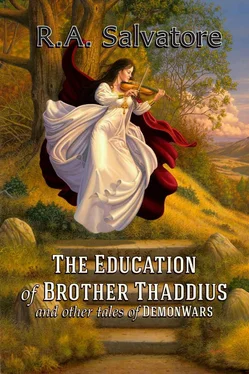R. Salvatore - The Education of Brother Thaddius and other tales of DemonWars
Здесь есть возможность читать онлайн «R. Salvatore - The Education of Brother Thaddius and other tales of DemonWars» весь текст электронной книги совершенно бесплатно (целиком полную версию без сокращений). В некоторых случаях можно слушать аудио, скачать через торрент в формате fb2 и присутствует краткое содержание. Год выпуска: 2014, Жанр: Фэнтези, на английском языке. Описание произведения, (предисловие) а так же отзывы посетителей доступны на портале библиотеки ЛибКат.
- Название:The Education of Brother Thaddius and other tales of DemonWars
- Автор:
- Жанр:
- Год:2014
- ISBN:нет данных
- Рейтинг книги:5 / 5. Голосов: 1
-
Избранное:Добавить в избранное
- Отзывы:
-
Ваша оценка:
- 100
- 1
- 2
- 3
- 4
- 5
The Education of Brother Thaddius and other tales of DemonWars: краткое содержание, описание и аннотация
Предлагаем к чтению аннотацию, описание, краткое содержание или предисловие (зависит от того, что написал сам автор книги «The Education of Brother Thaddius and other tales of DemonWars»). Если вы не нашли необходимую информацию о книге — напишите в комментариях, мы постараемся отыскать её.
The Education of Brother Thaddius and other tales of DemonWars — читать онлайн бесплатно полную книгу (весь текст) целиком
Ниже представлен текст книги, разбитый по страницам. Система сохранения места последней прочитанной страницы, позволяет с удобством читать онлайн бесплатно книгу «The Education of Brother Thaddius and other tales of DemonWars», без необходимости каждый раз заново искать на чём Вы остановились. Поставьте закладку, и сможете в любой момент перейти на страницу, на которой закончили чтение.
Интервал:
Закладка:
Not so long ago, his heart had leaped with joy at the whispers that Marcalo De’Unnero approached St.-Mere-Abelle and would claim the Church as his own. How thrilled was Mars to believe that he could throw off his façade, discard this lie his life had become, and proclaim openly his support for De’Unnero! How he had hoped that he would stand beside that man, the greatest warrior the Abellican Order had ever known, to reshape the Order into one of sacrifice and valor and utter devotion!
Guilt brought many pained squints to Mars’s eyes that night as he replayed the disastrous battle. He should have been stronger. He should have gone to Marcalo De’Unnero in the great hall and fought beside the man.
He conjured the image, burned forever into his memory, of De’Unnero lying dead on the stairs beside the woman called Sadye. Brother Mars should have been there, fighting with his idol, dying beside De’Unnero if that, too was God’s will.
He should have.
But he had failed.
At first glance, the brown-skinned man seemed quite out of place in this monastery, the mother abbey of the Abellican Church, but Pagonel walked with a quiet confidence and ease, and if he was out of place, no one had bothered to tell him.
He was a small man, well into middle age, thin and wiry, though not a nervous and excitable type like Brother Viscenti. He walked in sandals, or barefoot, as he was now, and in either case, a shadow made no less noise than he. He wore a tan tunic and loose-fitting pants, tied at the waist with a red sash, the Sash of Life, the highest rank of the Jhesta Tu mystics of Behren.
He stood in a grand hallway now, the Court of Saints, lined on one side by windows looking out over All Saints Bay, and on the opposite wall by grand paintings of the heroes of the Abellican Order, amazing works of arts that each stood twice the height of Pagonel. Few who were not of the Abellican Order had ever seen this place, but Bishop Braumin had offered Pagonel free rein of St.-Mere-Abelle, naming the mystic as one of the true heroes of the battle that had, in Braumin’s words, “defined the world.”
Pagonel hadn’t even really fought in that battle, not conventionally at least, although if he had, then surely many would have fallen before him. He was Jhesta Tu, and a grandmaster of that martial art. An Allheart Knight’s shining armor would not protect him from the lethal hands of Pagonel, for the mystic could strike with the speed of a viper and the strength of a tiger. A warrior’s sword would never get close to striking him, for Pagonel could move like the mongoose, faster than the sword hand, faster than the eye.
But no, he hadn’t fought in the battle, other than to fight against the battle. When Midalis and Aydrian and their closest cohorts had engaged in their duel in the great hall of the monastery, Pagonel, riding the dragon Agradelious, had flown low about the larger battlefield, calling for peace, insisting that the victor would emerge from within St.-Mere-Abelle, no matter the outcome on the field. He had saved many men and women that day outside of St.-Mere-Abelle, and in the aftermath, many indeed had come to him with their thanks and praise.
None of that had been lost on Bishop Braumin. On Braumin’s word, Pagonel could go where he pleased in St.-Mere-Abelle, and could stay as guest of the Church for as long as he desired.
Truly the mystic had been pleasantly surprised by what he had found in the quieter corners of the great monastery, whose walls ran a mile long atop the cliff wall, and where secret stairways led to quiet rooms full of wondrous treasures — of sculpture, painting, glassworks, tapestries, and jewelry design.
As in this hall, lined with huge paintings meticulously and lovingly crafted.
Lovingly.
Pagonel could see that truth in every delicate stroke, in the favorable and painstaking use of light, in the frames, even, wrought of gold and as artistic as the paintings themselves.
One in particular caught the mystic’s eye and held him, and not only because of the subject — the only woman depicted in any of the hall’s masterpieces — but because of the sheer grace in the form, her form. She was dressed in a long white gown, her heavy crimson cape flying about her shoulders as she moved and played a beautiful morin khuur of burnished, shining wood, her fingers gracefully working the bow across the four strings.
The light in the hallway, dying as the sun set in the west, was not favorable at that time of day, but Pagonel remained, transfixed, until darkness filled the hall, and then some more.
A young brother entered the far end of the hall, a small man and exceptionally thin, given the way his robe seemed to flop about him with every step. Pagonel watched him closely as he lifted his hand and placed a tiny, glowing diamond upon a platter lined with crystal. He chanted quietly and moved along, placing a second enchanted diamond near to the middle of the room.
Again he moved down the hall, chanting, but his prayer was surely interrupted when he noted Pagonel standing before the one of the paintings.
“Master Pagonel,” he said with a seemingly polite bow, though the perceptive mystic caught a bit on unease accompanying the dip, for it was not offered sincerely and more out of necessity. “I am sorry if I have disturbed you.”
“Far from it,” the mystic replied. “I welcome the light, that I might continue to stare at this most lovely figure.”
The young brother, his narrow features seeming sharper in the diamond light, stared at the image before the man. “St. Gwendolyn,” he explained.
“I have heard this name.”
“A great warrior, so the legend claims,” the brother explained, moving near to the mystic.
“Legend? Is she not sainted, and does such an action not declare the legend as fact?”
The small man shrugged as if it did not matter.
“She has an interesting choice of weapon,” Pagonel said, motioning back to the picture and the woman. “One might expect a bow of a different sort on a battlefield.”
“St. Gwendolyn was known as a fine musician,” the monk explained.
“The morin khuur,” Pagonel replied. “A most difficult instrument to master.”
“Morin khuur?”
Pagonel pointed to the instrument, then turned his fingers to match the pose of Gwendolyn as she handled the bow.
“It is a violin,” the young monk explained.
“Ah,” said the mystic. “In To’gai, they have such an instrument and name it morin khuur.”
The monk nodded, and again, to perceptive Pagonel, he seemed as annoyed as enlightened by the news. The furrow in this one’s brow came quite easily, Pagonel noted, as if he was not a content man, by any means. He was young, quite young, perhaps in his early twenties and surely no aged master of the abbey, and yet he was handling the magical gemstones with ease and proficiency, as the lighted diamonds clearly reminded.
“Tell me of St. Gwendolyn,” Pagonel bade him. “A warrior, you say.”
“With her violin,” the monk explained. “So says the legend that when a band of powries gained the beach along the Mantis Arm and came at the brothers and sisters of her chapel, Gwendolyn took up her instrument and boldly ran to the front of the line. And so she played, and so she danced.”
“Danced?” There was more intrigue than surprise in Pagonel’s voice, as if he suspected where this might be going.
“Danced all about her line, all about the powrie line,” the monk went on. “They could not turn their attention from her, mesmerized by her movements and the beauty of her song, so it is said. But neither could they catch up to her with their knives and spiked clubs, no matter how furiously they turned in pursuit.”
“And thus they were not prepared when Gwendolyn’s allies struck them dead,” Pagonel finished, smiling and nodding at the monk.
Читать дальшеИнтервал:
Закладка:
Похожие книги на «The Education of Brother Thaddius and other tales of DemonWars»
Представляем Вашему вниманию похожие книги на «The Education of Brother Thaddius and other tales of DemonWars» списком для выбора. Мы отобрали схожую по названию и смыслу литературу в надежде предоставить читателям больше вариантов отыскать новые, интересные, ещё непрочитанные произведения.
Обсуждение, отзывы о книге «The Education of Brother Thaddius and other tales of DemonWars» и просто собственные мнения читателей. Оставьте ваши комментарии, напишите, что Вы думаете о произведении, его смысле или главных героях. Укажите что конкретно понравилось, а что нет, и почему Вы так считаете.












